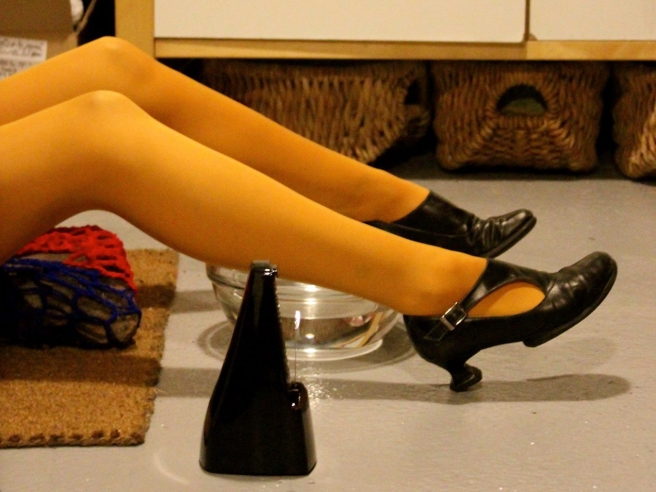by EL Putnam
I am sitting on the ground, near the back of the room in front of a glass door. My legs are angled, heels on the floor, toes in the air. My hands touch the cold concrete below me, but my head is raised and I maintain an unfocused gaze. People enter the space — a kitchen in Arbour Hill, Dublin, Ireland. They chatter away, sipping on beers. A bowl of water sits between my legs and a metronome rests to my right. I turn on the metronome so it ticks at 42 beats per second — the regular clicking of the mechanical object draws the audience attention to my presence. I stare at them, scanning my gaze across the room. I slowly rise, letting my spinal cord unwind one vertebrae at a time. As I lift, it becomes apparent that a rock is suspended between my thighs, harnessed by a crocheted net and attached to a knit rope, created from red and blue yarn in a loose reference to the circulatory system. The rope wraps around my torso, chest, shoulders, allowing the weight to be distributed around me while melding its form to my body. I spread my legs in a subtle squat as I raise my back until my head is aligned with my pelvis. Then, I bend down, again at a leaden pace, even more slowly than the metronome in order to dilate time and allow my gestures to be pushed by the weight of the stone that enwraps me. I lift the bowl of water, though ensuring that the rock does not brush the ground.


Once the bowl is chest level, I recite from memory the first part of article 41, section 2 of the Irish constitution:
In particular, the State recognises that by her life within the home, woman gives to the State a support without which the common good cannot be achieved.
I submerge my face in the bowl of water and let out a guttural scream, liberating a pent up anger amalgamated from fragments of experience as a woman, a mother, a foreigner, an outsider. I last until my breath depletes, the water bubbling around my immersed features.
I lift my head, whipping my hair back, droplets releasing in sprinkled trajectories. I collect my composure, allowing the weight of the rock and the water to stabilise and ground me. I recite the second part of article 41, section 2 of the Irish constitution:
The State shall, therefore, endeavour to ensure that mothers shall not be obliged by economic necessity to engage in labour to the neglect of their duties in the home.
My memory fumbles; I am unable to dictate it exactly, though I let the words tumble from my lips without making an attempt to correct them. I let my body curve downwards, descending with the force of gravity as I replace the bowl on the ground. Pulling myself into an erect posture, I move towards the front of the room, placing down each foot with the beat of the metronome, letting the repetitive pulse carry me. I continue through the hallway and make my way up the stairs, maintaining my rhythm. Someone follows me to the bathroom. I can feel her presence behind me. I enter the bright tiled room, shifting my body as I grab the door, swinging it shut. Our eyes meet for a moment as it slams in her face. I end my actions alone, deep in the core of the house.

As an American living in Ireland, there is a part of me that always feels foreign — external and excluded. Stepping into this different cultural environment, my sense of familiarity is warped as I am forced to adapt to a new normal. Everything I thought I knew of the mundane is twisted as what I have taken for granted in the daily running and maintenance of my life turns alien. Becoming a mother in a foreign context amplified these sentiments as I am made vulnerable to a medical system and cultural understanding of the maternal that counters my expectations. In particular, the influence of the Catholic Church that has seeped to the core of the nation’s infrastructure during its formation and development remains an ideological spectre. While the culture takes a secular turn, there are elements that linger. I did not anticipate it to affect me so greatly, drawing up memories of discomfort from a faith I left behind long ago. Like a spiritual muscle memory, it remains engrained in my physiology. Caught in this context, with a reflexive bristle whenever I find the need to adjust, I test the limits of my malleability. My emotions simmer as I come to a new, negotiated state of being, all the while ushering a new human into the world.
EL Putnam performed Enough Rope at “Room,” organized by Angela McDonagh on September 30 2016. Photographs by Cathy Coughlan.
